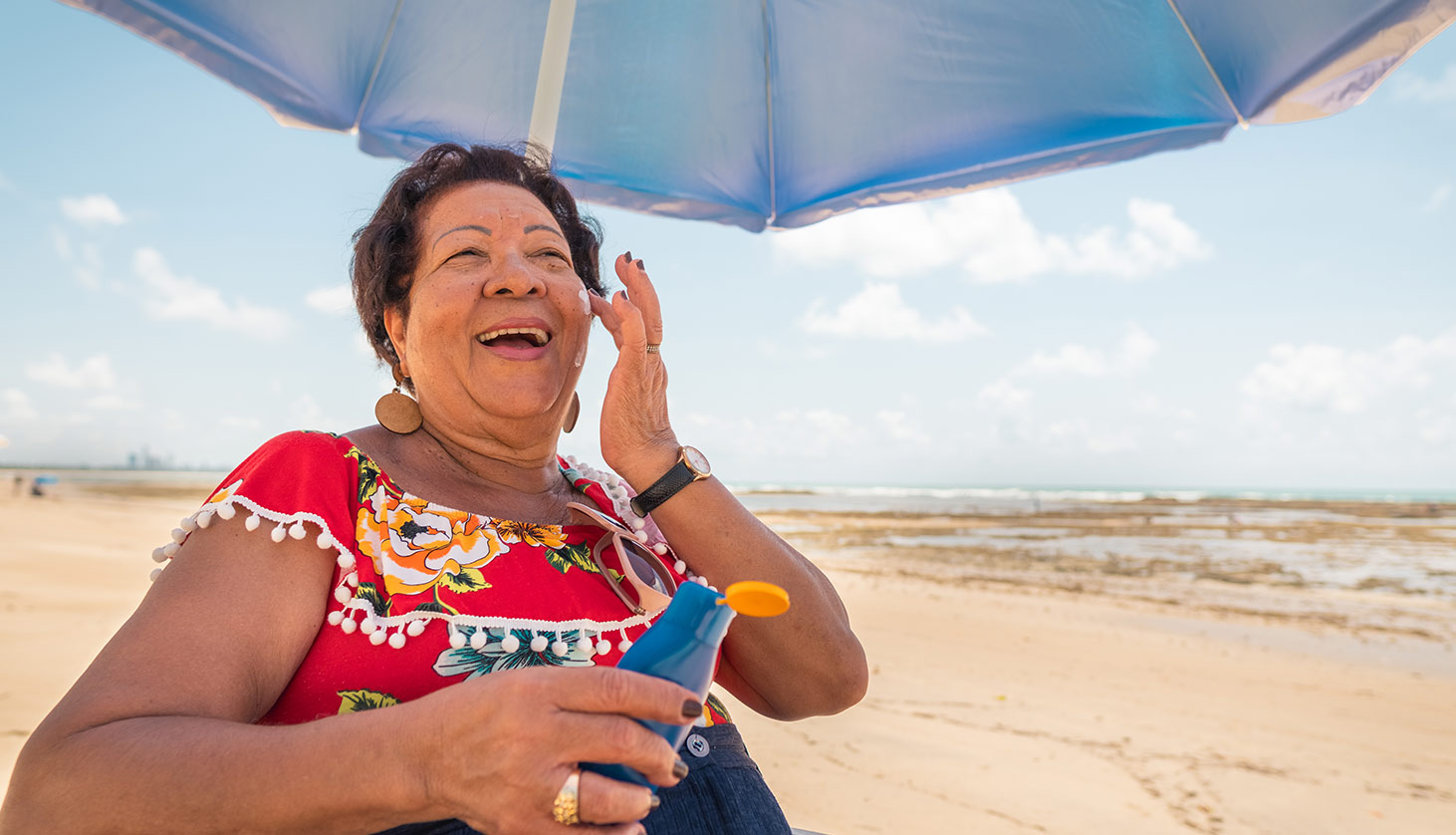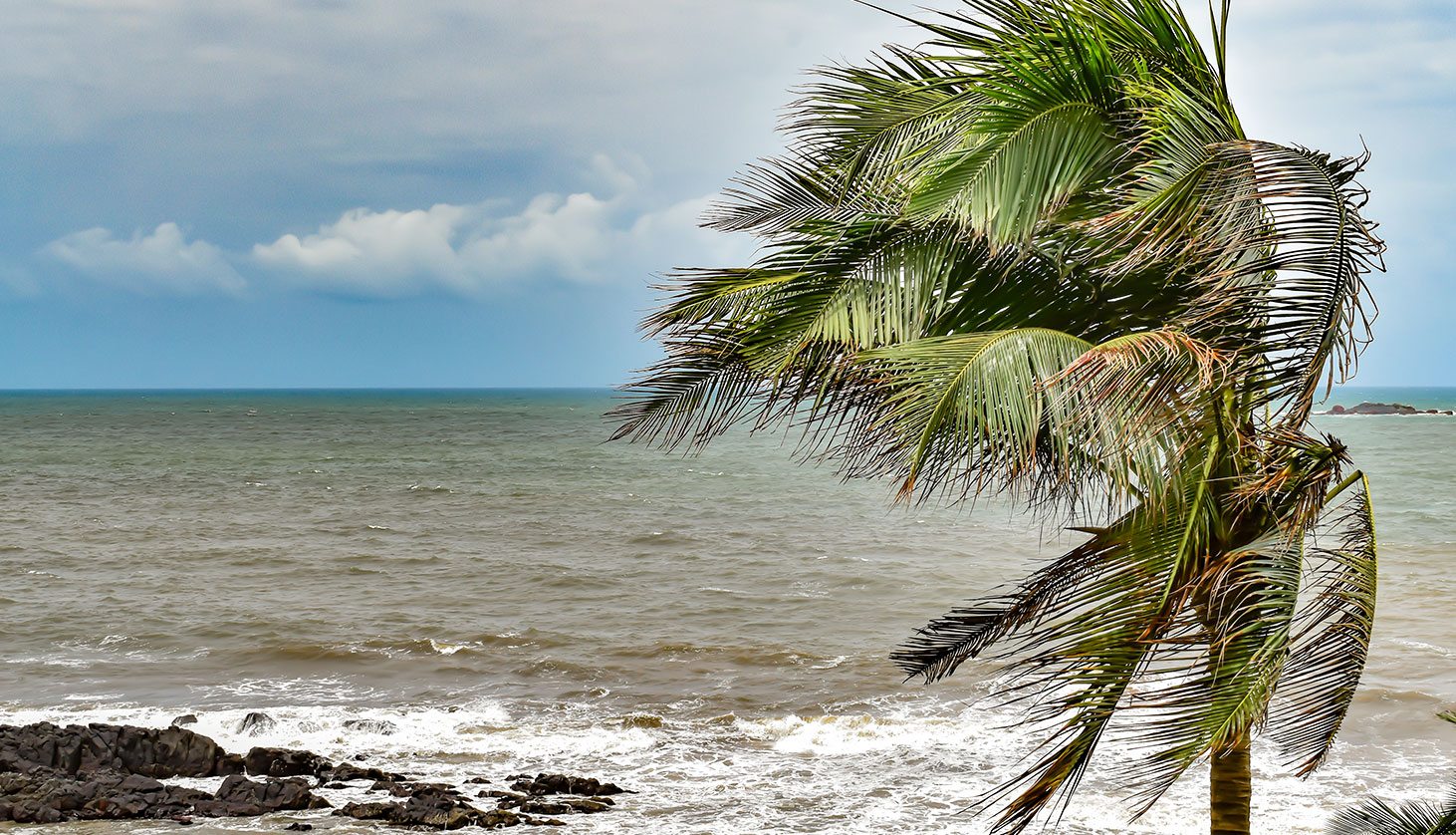Going to the beach should be fun for everyone! Seniors are no exception.
Getting some fresh air is especially great for older adults since it gets them out of the house and comes with many health benefits.
A study in the International Journal of Environmental Research and Public Health found that being outdoors and active is connected to fewer depressive symptoms, greater self-reported physical functioning, and lessened fears of falling for older adults.
Seniors need some extra care and prep beforehand to make sure they’re safe in the sands. Below, we’re going over all of the things you should do to prep for your upcoming beach day with an older adult.
Table of Contents
- What to Pack
- COVID-19 Precautions
- Location, Traveling and Parking
- Walking and Fall Prevention
- Sun Safety
- Dehydration Prevention
- Water Safety
- Additional Beach Safety Resources
What to Pack
There are a few things you should pack and put on before heading out to the beach. Beach chairs and frisbees are things you definitely shouldn’t forget, but other items like medication and water are crucial for older adults. We highlight a few of these important things in this list.
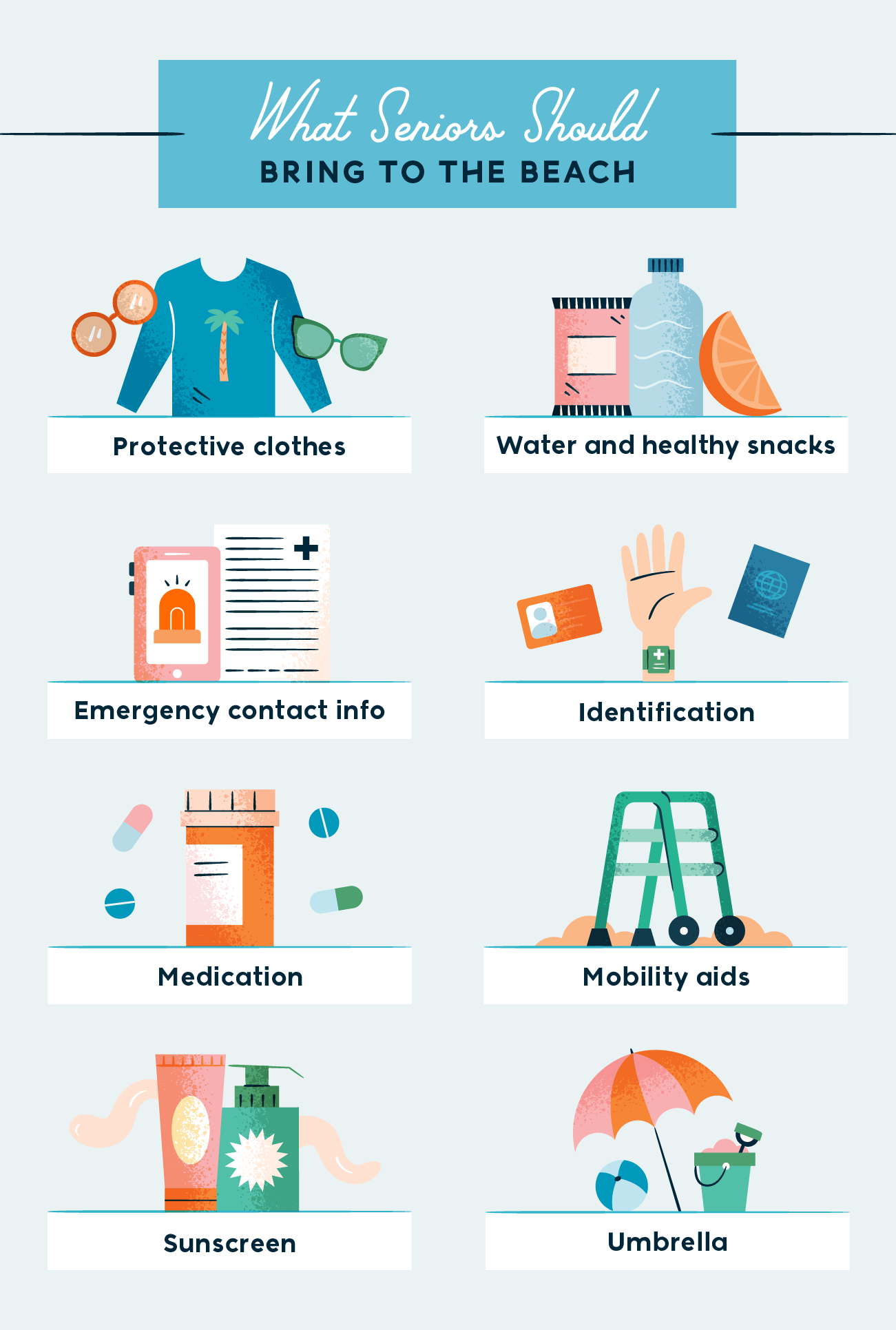
- Beach shoes: Comfortable, well-fitting shoes are a necessity for older people. At the beach, a pair of snug and lightweight shoes can protect feet from sand burns, cuts from broken shells or rocks, and help prevent falls.
- Cool water: Water is essential for any beach day to stay cool and manage your body temperature.
- Emergency contact information: Keep this information in your phone and paper in case your phone loses battery. Get information as well for nearby doctors and health facilities.
- Hats: A wide-brim hat protects your face from the sun and gives you extra protection while you’re walking on the beach.
- Healthy snacks: Snacks are especially important for people with diabetes or who otherwise have low blood sugar. Keep some healthy options close like fruit kabobs and trail mix.
- Identification: Adults with dementia or similar ailments may have trouble finding you if they get lost. Keep contact information sewn into clothes or on an accessory in case of an emergency.
- Medication: Bring their medication for the day so they don’t miss a dose. Check the labels to see if they need to keep any prescriptions at room temperature. If so, ask their doctor for storage recommendations while traveling.
- Mobility aids: Don’t leave behind their wheelchair, cane, or walker! Some beaches rent beach-specific mobility aids that are better suited for the terrain. You can also get wheelchair mats to make the terrain safe and flat.
- Protective clothes: Long sleeves and long skirts can keep your skin protected. Dense fabrics and loose clothes are good choices to protect yourself from the sun. If you want to go the extra mile, look for clothes with at least an ultraviolet protection factor (UPF) of 30.
- Sunscreen: Sunscreen is important for seniors to prevent skin cancer and slow skin aging. When picking sunblock, choose one that has broad-spectrum protection against UVA and UVB rays, a sun protection factor (SPF) of 30 or higher, and water resistance. Consider reef-safe sunscreen to keep the sea safe from harmful chemicals.
- Sunglasses: Eye protection protects your vision and prevents the risk of eye disorders. John Hopkins Medicine recommends getting sunglasses that wrap around your face. They also recommend shades that protect against UVA and UVB rays. Hats can also help keep the sun out of your eyes.
- Umbrellas: Beach umbrellas can give you a shady spot to relax. Hand umbrellas can give you portable shade while you walk along the shore.
Location, Traveling and Parking
When picking a beach, keep factors in mind like local weather, nearby healthcare services, and other things that can affect your day. Consider planning a short trip during the week to avoid the stress of weekend crowds. Seniors tend to have less resilience to stress, so minimizing stressors means a more relaxing day for everyone!
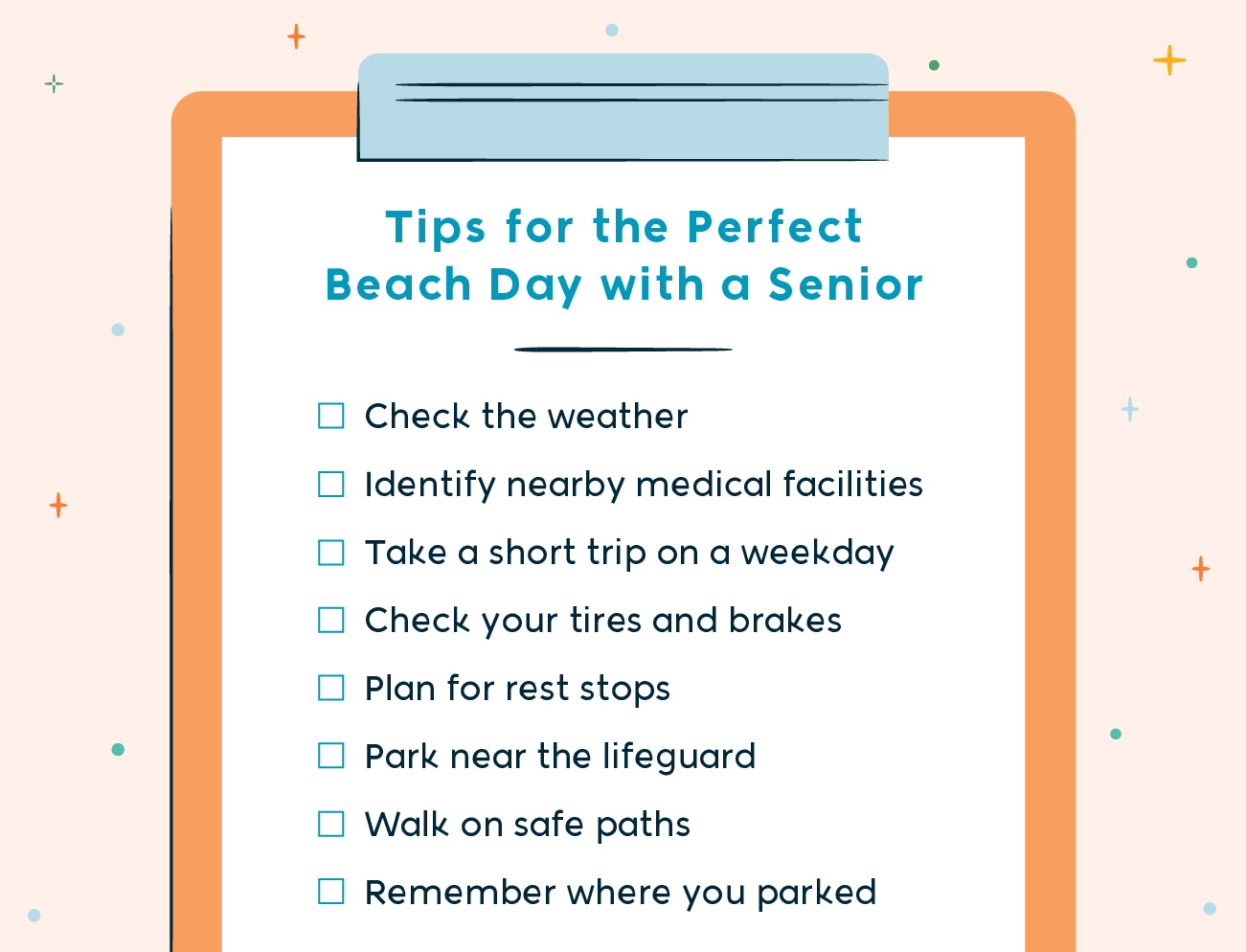
A shorter trip also ensures that you can have fun without overwhelming anyone. Trip time includes travel time from home to the beach and back. Get familiar with restroom stops and break areas between home and your destination.
Before leaving, make sure you prep your car with a full tank of gas and everything you need for your beach day. Check your brakes, tires, and lights. These checks can help avoid any unplanned stops. Most people find long stops boring, but older adults may feel uncomfortable if they’re in extreme weather.
When you get to the beach, pick a spot close to the lifeguard and that has safe terrain to prevent trips or falls. Don’t forget where you parked! A few extra laps around the parking lot can be tiring for seniors.
Walking and Fall Prevention
Pay extra attention when you’re helping a senior walk around at the beach. Soft sand, broken shells, and other surprises increase their risk of falling. Beach-ready shoes and mobility aids add some support, but you should still keep them company while they walk.
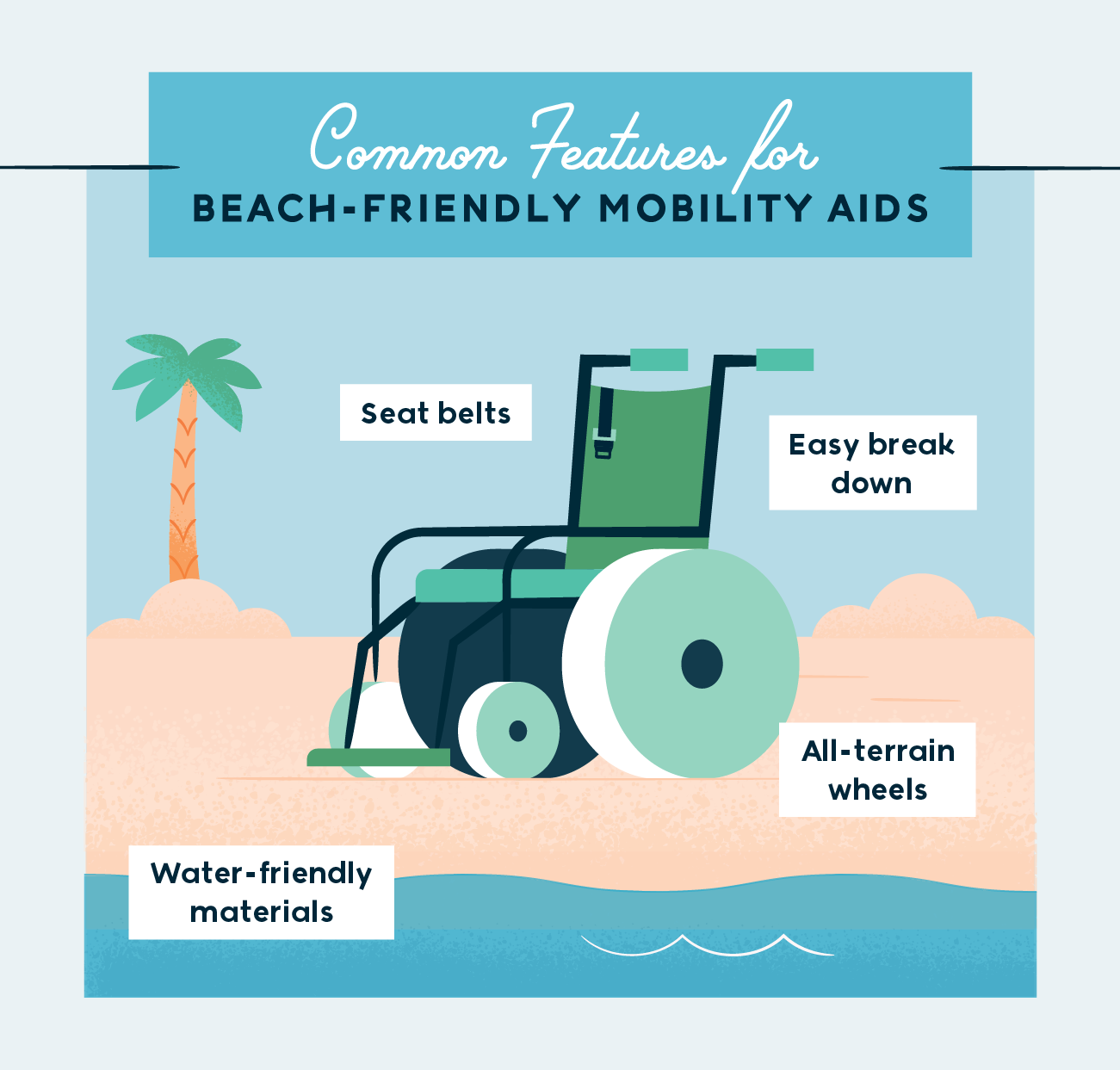
Check that mobility aids like walkers or canes are safe to use on sand and rocks. If you’re not sure, you can ask your doctor or rent beach-specific aids to stay safe. Wheelchair mats are other options if you don’t want to rent more equipment.
According to the CDC, falls are the leading cause of injury for adults ages 65 and over. Falls resulted in about 32,000 deaths in 2018. The CDC also found that one in five falls cause an injury, like head injury or broken bones.
Sun Safety
Getting some sunshine is great for everyone. Sunlight helps the body produce more vitamin D and serotonin. However, too much sunlight can become harmful. Overexposure raises your risk of skin cancer and heat-related illnesses.
Why Seniors Should Be Sun Safe
Older people are at a higher risk of skin cancer since their skin has had more time to get sun damage. Robert Norman, D.O., MPH, MBA said in a Skin Cancer Foundation article that our skin’s resilience against sun damage lessens over time as it endures more damage.
The CDC found that less than half of seniors protect their skin from the sun when they’re out on a warm, sunny day for more than an hour. They also found that more than one in five had a sunburn between October 2018 and October 2019.
Additionally, we tend to sweat less when we age. Sweat is one of the body’s ways of cooling down. Larry Kenney, Ph.D., said in a Penn State News article that sweating less isn’t directly related to age. He says it’s related to other things that change as we age like your fitness level, how sedentary you are, and how well you stay hydrated.
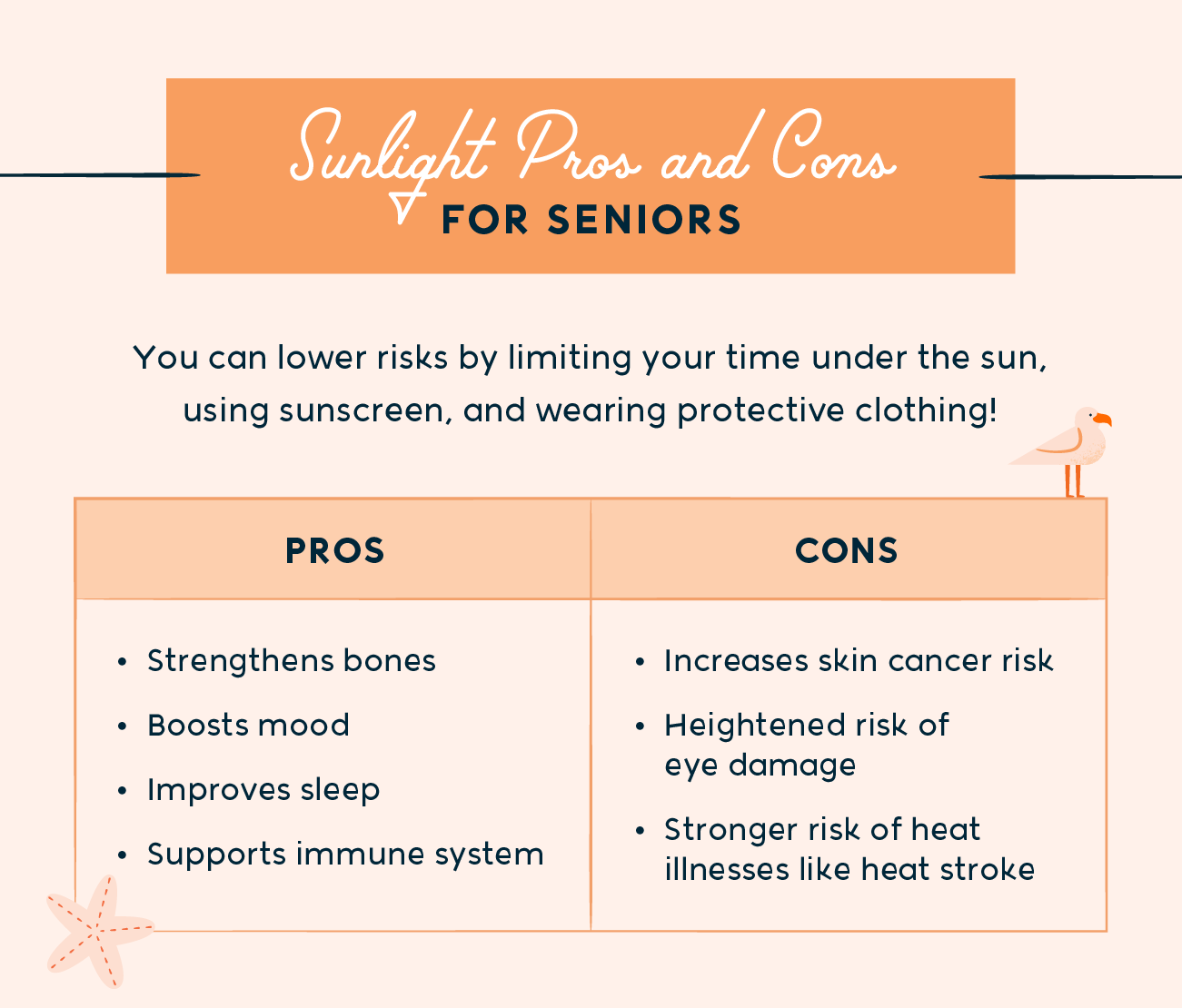
Ways to Prevent Sun and Heat Injuries
Take your beach trip early in the morning or later in the day. These are ideal times since you’ll avoid when the sun is highest in the sky.
You should also encourage everyone to wear sunscreen and reapply throughout the day. Apply sunscreen liberally all over your body about 15 minutes before you plan to go outside. This gives your skin time to absorb it. Reapply sunscreen every two hours, especially if you’re sweating or swimming. You should even wear sunscreen when it’s cloudy since the UV rays can shine through the clouds.
Long clothing, hats, and sunglasses can add to your skin protection while also enhancing your beach style! Beach umbrellas and hand umbrellas are other ways to stay cool while you’re at the beach. Take frequent breaks under your shelter to get a nice balance of sun and shade.
You should learn the signs of heat-related illnesses so that you can take action if needed. Symptoms range from hot, red skin to muscle pain or spasms. We list some examples of symptoms and tips to act below. But, we also recommend consulting with your doctor for advice.
| Illness | Symptoms | What to Do | When to Seek Care |
|---|---|---|---|
| Sunburn | ‣ Headache ‣ Skin that feels warm or hot to touch ‣ Swelling ‣ Blisters on the skin | ‣ Stay out of the sun ‣ Use cool cloths or compress on skin ‣ Stay hydrated | ‣ Severe swelling ‣ Large blisters ‣ Chills |
| Heat Rash | ‣ White or red bumps ‣ Small blisters ‣ Lack of sweat | ‣ Use powder to soothe skin ‣ Move to a cool, dry place ‣ Keep skin dry | ‣ Fever or chills ‣ Increased pain, swelling or warmth |
| Heat Cramps | ‣ Muscle spasm or pain ‣ Intense sweating | ‣ Rest in a cool place ‣ Stop physical activity ‣ Drink sports drinks or water | ‣ Cramps last longer than one hour ‣ Unable to drink because of nausea or vomiting |
| Heat Exhaustion | ‣ Fatigue ‣ Intense sweating ‣ Headache ‣ Dizziness ‣ Confusion ‣ Pale skin | ‣ Sip water ‣ Loosen clothes ‣ Take a cool bath or use cool cloths | ‣ Vomiting ‣ Symptoms get worse or last more than one hour |
| Heat Stroke | ‣ Confusion ‣ Coma or seizures ‣ Intense sweating ‣ High body temperature ‣ Fast pulse | ‣ Call 911 right away ‣ Ice bath ‣ Move to a cool area ‣ Don’t drink fluids | ‣ Immediately |
Sources: CDC 1, 2, | University of Rochester Medical Center | Cleveland Clinic
Dehydration Prevention
Older people don’t feel thirsty as often since their thirst response weakens over time. A senior is also at a high risk of dehydration, fewer fluids in the body, and medication side effects.
To prevent that, keep plenty of cool water nearby in a cooler and encourage older adults to drink up! Taking small sips throughout the day may be better for some who can’t drink lots of fluids at once.
Water Safety
Staying safe in the water is especially crucial for seniors. They may feel strong enough to withstand strong waves, but it doesn’t hurt to take a few extra precautions.
No one should go in the water by themselves, especially seniors, children, and people with disabilities. Having a buddy makes it easier to get help if someone gets a cramp, falls, or gets tired. You should also pick a beach with lots of lifeguards and pick a spot close to a tower.
You and your group should also get familiar with the signs of drowning. Drowning isn’t always dramatic or obvious like we see in movies. A person drowning may have their hands out next to or in front of them as they try to keep themselves above water. Their head will likely be slightly tilted back or at water level.
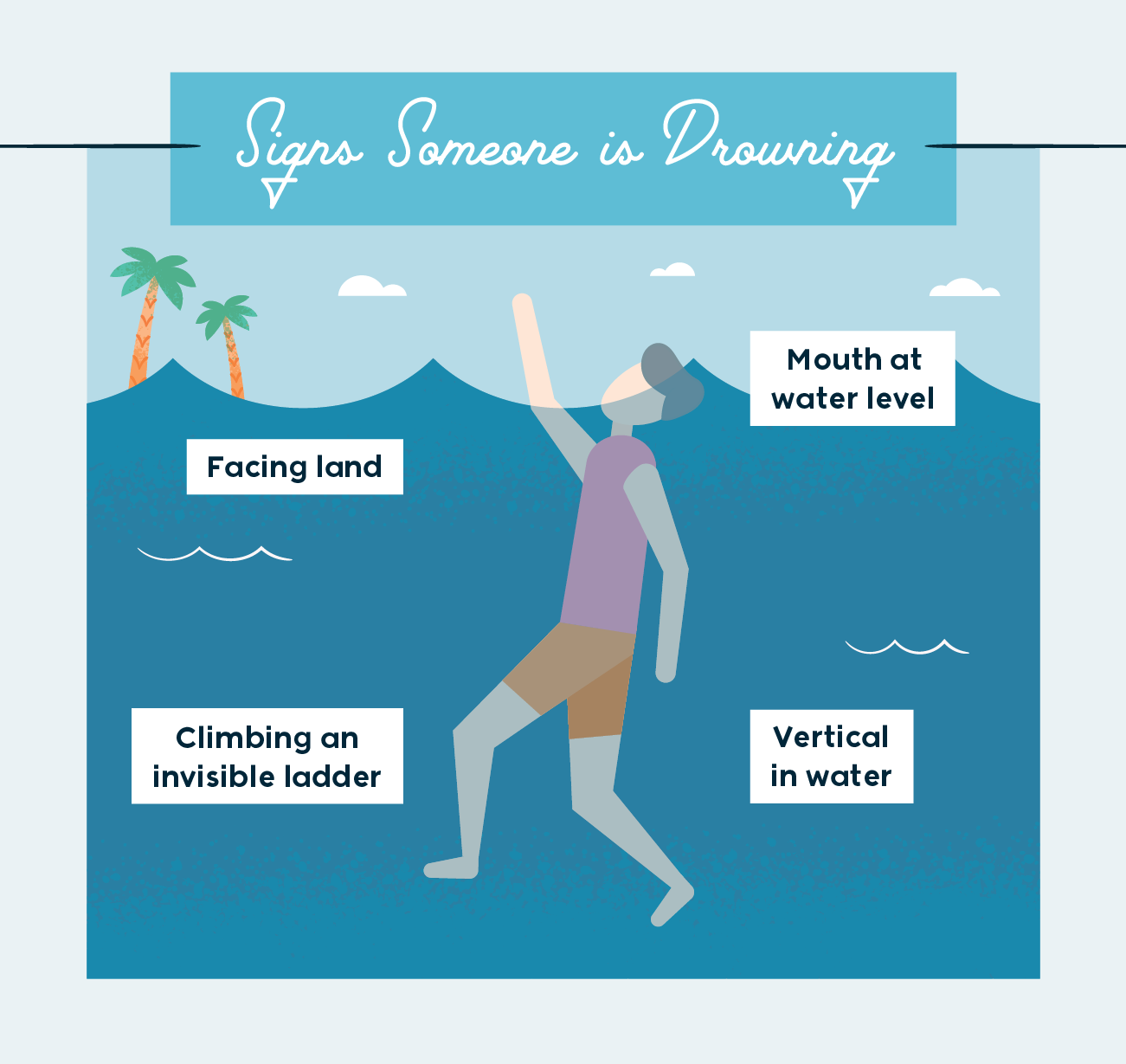
Strength, endurance, and muscle mass are just a few things that change and diminish as we age. Getting caught in a wave or losing your footing is not easy for seniors to recover from.
Older adults can practice swimming in a pool to get an idea of their endurance and potentially build their strength, but they should talk to their doctors first before starting any new physical activity.
Going in the water during low tide can also lower some of the risks. The National Oceanic and Atmospheric Administration (NOAA) has a tide predictor you can use to get the forecast in your area.
Besides preventing drownings and falls, you should also make sure seniors don’t get too cold. We lose body heat fast in water and seniors lose body heat faster than younger people. Spend short stretches in the water and give older adults time to warm up before heading back to the water.
Additional Beach Safety Resources
There are many more ways seniors can stay safe at the beach. Check out these resources below to learn more.
- American Red Cross offers more tips for staying safe at the beach.
- American Red Cross Training Services offers adult swimming lessons.
- CDC has lots of tips around drowning, injury, and sun protection.
- Healthline also has tips for staying safe at the beach.
- National Institute on Aging provides tips for keeping skin healthy.
Age shouldn’t be something that stops you from taking a trip to the beach or taking a longer beach vacation. When you’re planning your trip, consider any medical or physical limitations you and others may have so everyone can join in on the fun!
Sources: National Institute on Aging 1, 2 | WebMD 1, 2, 3, 4, 5, 6, 7 | FDA 1, | Healthline 1, 2, 3 | CDC | Manors of the Valley Senior Living Care | Griswold Home Care | Bay Alarm Medical | American Academy of Dermatology Association | University of Michigan Health | Mayo Clinic 1, 2, 3, 4 | Boat-ed | Michigan Radio
Disclaimer: FloridaPanhandle.com does not provide legal or medical advice. This post has been prepared for informational purposes only. All users are advised to check all applicable local, state, and federal laws and consult legal and medical counsel should questions arise.

